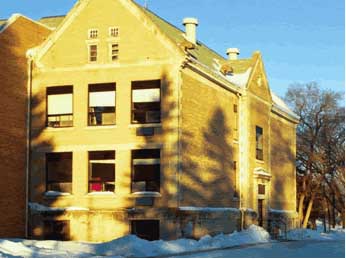Next Up Winnipeg:
for young adults who want to change the world
Next Up was created by a community of people who wanted to help emerging leaders (that’s you!) develop new and better skills, smarts and ideas. The program is intense. Over 6.5 months, we’ll dive into a number of topics and disciplines, combining theory, practice, deep thinking, and hard skills. We’ll look at how change is made in society. We’ll meet some of the most innovative change-makers in Manitoba — from the non-profit, labour, business and public sectors and from Indigenous, settler and newcomer communities— who are working for a better world.
Who should apply? You are:
• Aged 18–32
• Passionate about changing the way the world works, and committed to being active at the centre of social change
• Certain that there are better ways for us to take care of each other and the planet
• Willing to take a risk, join a team, and learn more about yourself
What level of commitment is required from me, and when?
By joining Next Up you’re committing yourself to an extraordinarily
rigorous and exciting program. The program runs from Nov 19, 2016 to May 31, 2017and during that time you will:
• Attend one week-day evening session 6 – 9 pm per week
• Attend one day-long weekend session per month (Generally Saturdays from 10-4pm)
Next Up Manitoba local partners:
Canadian Centre for Policy Alternatives – Manitoba, Canadian Community Economic
Development Network (CCEDNet) Manitoba.
Funded by the Winnipeg Foundation, United Food and Commercial Worker’s Union local 832, Manitoba Government Employee’s Union, The Catherine Donnelly Foundation, Manitoba Community Services Council and supported by the United Way of Winnipeg.
http://www.nextup.ca/07_2016_winnipeg
Book Review by Jim Silver
Although Carlo Fanelli’s book Megacity Malaise: Neoliberalism, Public Services and Labour in Toronto is not about Winnipeg, it offers many insights applicable to Winnipeg and to other Canadian cities. Fanelli is a former Toronto civic employee who looks at civic issues from the point of view of city employees and their unions. His central argument is that the fiscal problems confronting Toronto and all major Canadian cities are not caused by over-spending on civic services nor by excessive union wage demands, although this is what is typically claimed.

By Elizabeth Comack and Jim Silver
First published in the Winnipeg Free Press Sept 28, 2016
The recent death of Larry Morrissette (April 16, 1957 – Sept 20, 2016) is a major loss, not only to his family and friends but also to the many Indigenous and non-Indigenous people that he has worked closely with in recent decades in efforts to re-build Winnipeg’s inner city and revitalize Indigenous cultures.
Larry was the founder and Executive Director of Ogijiita Pimatiswin Kinamatwin (OPK), a grassroots organization that works closely with Indigenous people in trouble with or at risk of being in trouble with the law. Larry was loved by the many whose lives he changed. He was a co-founder—as part of the Thunder Eagle Society—of the highly successful Children of the Earth High School. He was a founder of the original Bear Clan Patrol and played a key role in its recent revitalization. He was a skilled researcher, involved in a wide range of inner-city studies, perhaps most significantly as co-author of the award-winning book, Indians Wear Red: Colonialism, Resistance and Aboriginal Street Gangs (Fernwood Publishing, 2013). And he was, for many years, a university teacher, bringing a rare combination of street-level experience and academic training to the classroom. Students loved the authenticity and quiet passion that he brought to their learning experience.
Lynne Fernandez
A new Canadian Centre for Policy Alternatives MB report: Balancing Convenience with Social Responsibility: Liquor regulation in Manitoba examines the way liquor is managed and sold in Western Canada. The report was authored by Greg Flanagan, a public finance economist.
The role of government in the control of alcoholic beverage sales and consumption has been under re-evaluation across Canada in various jurisdictions and contexts. Saskatchewan’s mixed public/private system, very similar to Manitoba’s, may be about to change. In the recent provincial election, the Saskatchewan Party’s Brad Wall – now Premier re-elect – claimed that “[t]he old public store-only option is not sitting with Saskatchewan people” and that “people are really interested in new stores being private or all stores being private”. The BC government has been revising the rules of the industry almost continuously in recent history, attempting to balance its notions of the government’s role with the opportunities for private enterprise—with mixed results.
 Larry Morrissette’s untimely death on September 19, 2016 is a great loss to Winnipeg’s Indigenous community and to all those active in making transformative change in Winnipeg’s inner city. Larry was the Executive Director of Ogijiita Pimatiswin Kinamatwin (OPK), a co-founder of Children of the Earth High School, one of the originators of the Bear Clan Patrol, an experienced university educator, and a man who worked tirelessly for people in trouble or at risk of being in trouble with the law.
Larry Morrissette’s untimely death on September 19, 2016 is a great loss to Winnipeg’s Indigenous community and to all those active in making transformative change in Winnipeg’s inner city. Larry was the Executive Director of Ogijiita Pimatiswin Kinamatwin (OPK), a co-founder of Children of the Earth High School, one of the originators of the Bear Clan Patrol, an experienced university educator, and a man who worked tirelessly for people in trouble or at risk of being in trouble with the law.
Larry also had a long and very fruitful connection with Canadian Centre for Policy Alternatives Manitoba (CCPA-MB) and the Manitoba Research Alliance (MRA). He worked closely with John Loxley and a team of researchers on an archival project that involved preserving the history of Aboriginal institutional development in Winnipeg. Larry, Elizabeth Comack, Lawrie Deane, and Jim Silver worked with street gang members to produce a report, “If You Want to Change Violence in the ‘Hood, You Have to Change the ‘Hood” (CCPA–MB 2009). They subsequently collaborated to produce the award-winning book, “Indians Wear Red”: Colonialism, Resistance, and Aboriginal Street Gangs (Fernwood Publishing 2013). At the time of his passing, Larry was working with Elizabeth on two MRA projects: a longitudinal study with men who have been in trouble with the law, tracking their progress in realizing pimatiswin, and a social history of the Bear Clan Patrol and its roots in Bear Clan teachings.
Larry was highly regarded in Winnipeg’s inner city, and especially in the Indigenous community. For those of us at the CCPA–MB and the MRA, Larry was a valued source of knowledge and wisdom, a kind and gentle soul—and a good and trusted friend. He will be deeply missed.
Elizabeth Comack and Jim Silver

By Ellen Smirl
This study evaluated The Madison, an 85 unit congregate housing apartment
located in Winnipeg Manitoba, using qualitative methods and a
cost-comparison to the findings of the At Home/Chez Soi Housing First
Study.
Given the persistent challenges of homelessness, it is worthwhile to
evaluate congregate housing models as one option in the continuum ofchoice
to address homelessness.
Findings of this study indicate that the Madison’s congregate model can
contribute to improved capacity building, quality of life, independence,
interdependence and community building for the residents of the Madison.
The report makes several recommendations for improvement.
The Madison is operated to Siloam Mission.
This research was peer reviewed by academic housing and homelessness
experts.
 First published in the Winnipeg Free Press Sept. 13, 2016
First published in the Winnipeg Free Press Sept. 13, 2016
By Lynne Fernandez
This fall Winnipeg City Council will determine the future of waste and recycling collection in our city. Current contracts with Emterra Environmental and Progressive Waste Services will expire in 2017. At least eight private companies have expressed interest in putting forward a proposal, and it will be up to council to select from the various applicants. While garbage is generally not a “sexy” topic, there are many reasons why the public should be paying attention.
By Lynne Fernandez
A new Errol Black Chair report released today examines how events are unfolding in Churchill and The Pas. It puts these events in the context of the entire Northern region and urges government to consider the needs and aspirations of Manitoba’s Northerners when considering the best way to help.
The report explains how the recent job losses caused by the Churchill port closure and Tolko plant shut down will reverberate throughout the local economy. But this study also recognizes that billions of dollars of profit have been extracted from the North and enriched people and companies with little or no connection to the region. Whether it be through hydro, mining or logging, First Nations peoples have rarely benefitted from southern enterprise and, up until recently, were not even consulted when megaprojects were planned and implemented – even though the projects destroyed traditional lands and lives.
Manitoba’s population is around 17 per cent Indigenous, and the median age in this group is 21 years, vs. 39 in the population as a whole. When we talk about the Northern economy, we should be putting it in the context of the predominately Indigenous population, keeping in mind that this population is diverse, young and growing faster than the non-Indigenous population. Because it is also a population that has not fared well under modern, colonial economic development it is now turning to its own resources and ideas to chart its own course.
The report provides details on the innovative work being done by Indigenous communities and provides recommendations for how that work can be scaled up. It concludes that there is no need for an entire region to remain underdeveloped, but Northerners themselves need to drive the change.

By Lynne Fernandez
Manitoba Government and General Employees Union members at Macdonald Youth Services (Local 221), who provide crisis intervention services to youth and families in Winnipeg, walked off the job on August 2, 2016. This move was not undertaken on a whim: strike action is the last resort in any negotiation and is an indication of the level of frustration that these members have reached.




Follow us!